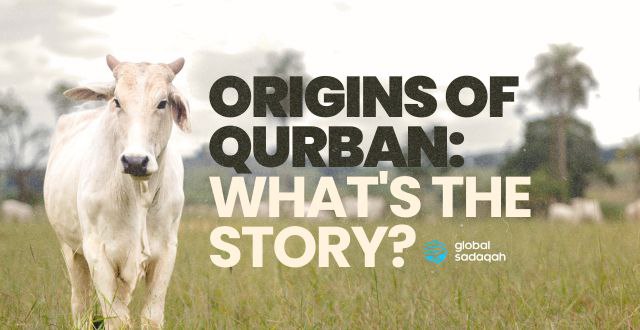The Story of Qurban: Why Do We Make This Sacrifice?
This blog post was based from our special ebook called “Hajj & Qurban Made Easy”. If you enjoyed reading this, do give our ebook some love!
Picture this: it’s Eid al-Adha, and families gather, hearts brimming with excitement and gratitude. The kids can’t wait to get their second round of Eidi and your wallet is almost out of ringgits.But amidst the festivities, have you ever wondered — why do we Muslims partake in the ritual of Qurban? Let’s take a moment and look into the Sunnah and (a small peek) into the history of Qurban, uncovering its significance and uncovering the traditions passed down through generations.
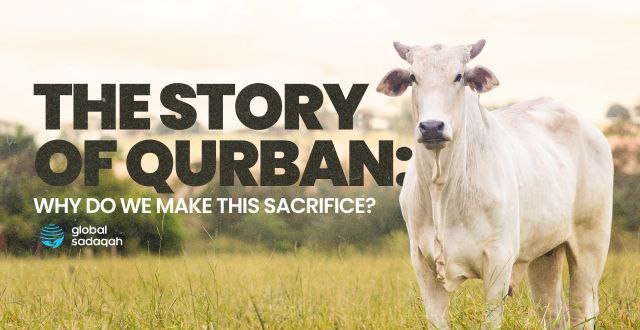
Origins of Qurban: What’s the Story?
The story of Prophet Ibrahim (alayhi salam) is full of gems and benefits! The Qur’an tells us the journey of Prophet Ibrahim (alayhi salam), a champion of tawhid. And with these challenges, the sacrifices he made to be from the greatest prophets of Allah, or the ‘Ulul-‘Azm. From the epitome of sacrifice, we have the story of the Qurban, where Prophet Ibrahim (alayhi salam) and his son, Prophet Ismail (alayhi salam), are pivotal characters.
In Surah As-Saffat, Allah tells us the story of Ibrahim (alayhi salam) and his son:
“So We gave him the good news that he would have a forebearing son.”
[Surah As-Saffat, 37:101]
For context, Ibrahim (alayhi salam) was already of a very old age when he finally was given a son from Allah! Yet in the next verse, as if the happiness was short-lived, Allah tested him and ordered him to sacrifice the only progeny he had at that time, Ismail (alayhi salam).
“When the boy was old enough to work with his father, Ibrahim said: ‘O my son, indeed I have seen in a dream that I [must] sacrifice you, so what do you think?’–
Can you imagine the weight of such a request? His only son at that time, after raising him to an age where was able to work with his father– imagine the love he had for him, and the hope within him to carry on his progeny, but Allah’s love for them both was greater.This was a huge test for both Ibrahim (alayhi salam), and Ismail (alayhi salam), however the response of Ismail (alayhi salam) proved Allah’s Promise to grant Ibrahim (alayhi salam) a patient son:
– He [Ismail] said, ‘O my father, do as you are commanded. You will find me, if Allah Wills, of the steadfast.”
[Surah As-Saffat, 37:102]
Prophet Ibrahim (alayhi salam) had unwavering faith and reliance upon Allah. With that, Ibrahim (alayhi salam) laid his son Ismail (alayhi salam) on the ground, and raised the knife to sacrifice his son. At that moment, Allah intervened:
“And when they had both submitted, and he had laid his son down upon his forehead, We called to him “O Ibrahim, you have fulfilled the dream. Indeed, We thus reward the doers of good. Indeed, it was a test to prove [their true characters]- and We ransomed his son with a great sacrifice.”
[Surah As-Saffat, 37:103-107]
This event marks the origins of Qurban, symbolizing obedience and submission to the divine will of Allah (subhanahu wa ta’ala).
“And We let him be praised by succeeding generations. ‘Peace be upon Ibrahim!’”
[Surah As-Saffat, 37:108]
Why Does Qurban Matter?
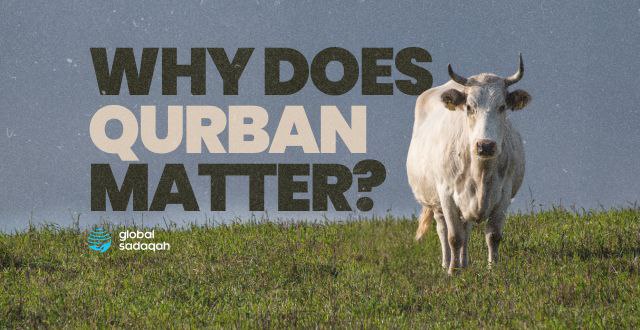
But why commemorate this event through Qurban? It’s more than just a ritual—it’s a symbol of devotion and gratitude. As Allah mentions in the Qur’an:
“Their meat will not reach Allah, nor will their blood, but what reaches Him is piety from you…”
[Surah Al-Hajj, 22:37]
Through Qurban, Muslims honor the willingness and submission of Prophet Ibrahim (alayhi salam) and Prophet Ismail (alayhi salam) to sacrifice everything for the sake of Allah. It’s a reminder of the importance of faith and obedience in our lives, echoing the values cherished in Islam.
How Do We Perform Qurban?
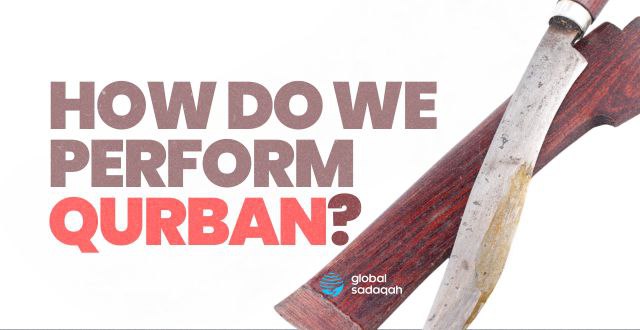
So, what does the process of Qurban entail? It starts with intention—declaring our commitment to perform this act for the sake of Allah. Then comes the selection of a permissible animal, such as a sheep, goat, cow, or camel. The animal is slaughtered in accordance with Islamic guidelines, ensuring a respectful and humane process. Finally, the meat is divided into three parts—one for ourselves and our families, one for relatives and friends, and one for those in need.
But Who Benefits from the Qurban?
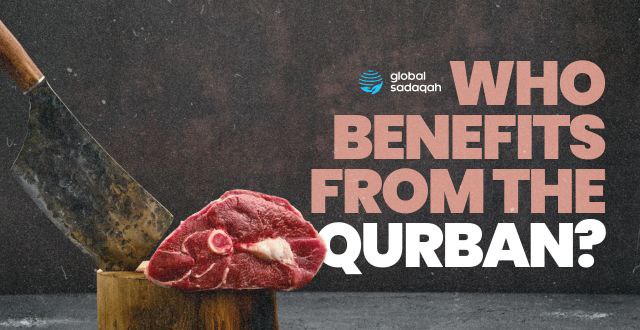
Qurban isn’t just about personal sacrifice—it’s about sharing blessings with others. By distributing a portion of the meat to those less fortunate, we strengthen the bonds of community and fulfill our duty to help those in need. It’s a powerful reminder of the importance of compassion and generosity in Islam.
How Can You Participate?
Now that you understand the significance of Qurban, how can you get involved? That’s where we come in! GlobalSadaqah offers a platform for individuals to fulfill their Qurban while supporting charitable projects worldwide. By participating in Qurban through GlobalSadaqah, you can ensure that your sacrifice reaches those who need it most, spreading joy and relief to communities in need, inshaAllah.
So as we celebrate Eid al-Adha and partake in the tradition of Qurban, let’s reflect on its deeper meaning. It’s not just about the sacrifice of an animal—it’s about sacrificing our desires for the sake of Allah and showing gratitude for His blessings. So, as you gather with loved ones this Eid, remember the story of Ibrahim and Ismail (alayhim salaam) and the significance of Qurban.
